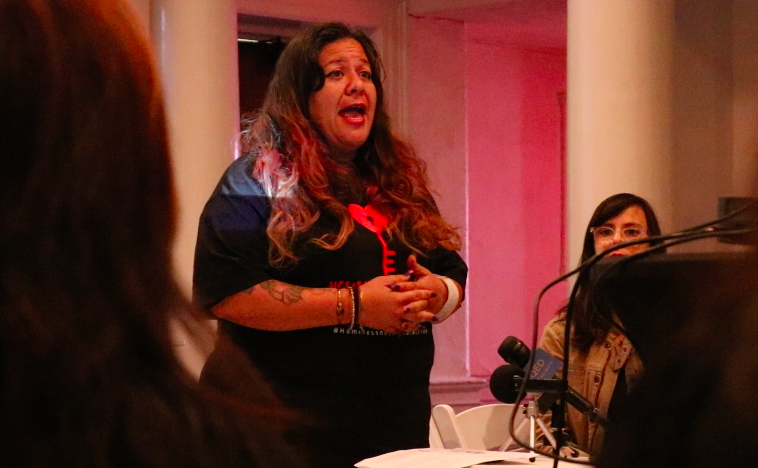
Needa Bee speaks at a press briefing on the report. (Courtesy of The Dellums Institute)
A new report exposes the demographics of Oakland’s homeless community, and examines realistic solutions provided by unhoused people.
A new report confirms what many of Oakland’s unhoused residents already knew: The scale of Oakland’s homeless crisis stretches far beyond the 2,761 unhoused people that the city officially acknowledges. “Housing Oakland’s Unhoused,” published in October by the Housing and Dignity Project, reports that Oakland is home to as many as 9,297 unhoused individuals, a number derived from Alameda County’s HealthCare for the Homeless analysis.
Three organizations tackling Oakland’s housing crisis—The Village, the East Oakland Collective (EOC), and the Dellums Institute for Social Justice—comprise the Housing and Dignity Project, which collaborated with UC Berkeley’s Goldman School of Public Policy to produce “Housing Oakland’s Unhoused.” The report seeks on the one hand to demonstrate the urgency and feasibility of immediate redress, and on the other hand, to dismantle misconceptions about homelessness, overwriting pejorative narratives with assertions of unhoused leadership.
The report cites Oakland’s current median rent as over $3,200 per month. A renter making the median income and paying rent at this rate would spend 75 percent of each paycheck on housing—a significant jump fr om the 55 percent reported in 2014, and far over the 30 per cent that the U.S. Department of Housing and Urban Development considers financially sustainable.
Increasingly, Oakland’s unhoused residents are struggling with the unpredictability of a city in flux— not just with mental illness or addiction, as is commonly assumed. Candice Elder, the EOC’s founder and executive director, points out that addiction and mental illness do not preclude the right to shelter and safety.
“That said, this isn’t Reagan’s chronic homelessness,” said Elder. “It’s a new wave. It’s our brothers and sisters, our neighbors, our coworkers. People with jobs step out of tents well-dressed, go off to work, and no one knows they’re homeless.”
Needa Bee, the founder of The Village, was housed when she began her social justice work. Now, she is unhoused.
“I have a 30-year-old cannery business here in Oakland, and I’m a salaried program director of the Meiklejohn Civil Liberties Institute,” said Needa. “I can’t afford to live here.”
As the report notes, Oakland’s present-day unaffordability disproportionately affects African Americans—a state of affairs undergirded by a long history of racism and exploitation. The report traces Oakland’s history along racial lines, from redlining in the 1930s to the racial targeting of subprime loans in the mid-2000s to the color of homelessness today.
African Americans represent 28 percent of Oaklanders, but 68 percent of the city’s unhoused. Older Black adults face double the risk of losing their housing compared with other ethnicities, and African American families with children are the fastest growing homeless population.
Race also changes the lived experience of homelessness. Oakland’s 14 anti-homeless laws— which, according to the report, “criminalize the homeless ‘sometimes even for sleeping and eating’”— make unhoused people vulnerable to police intervention. When Needa and her daughter lived in their camper, police would frequently come to enforce an Oakland law that prohibits living in cars.
“My daughters look Black,” Needa said. “To have the cops called puts them at a greater risk than me.”
These interactions were so stressful for Needa’s 16-year-old daughter that she pulled out of Berkeley City College, unable to concentrate on her homework.
If homelessness is an unsustainable hardship but Oakland’s exorbitant rents put housing out of reach, why do unhoused people stay in the area? As Elder points out, unhoused people often rely on local support systems, networks of friends and family that may extend back for generations. Indeed, the report states that 86 percent of unhoused people in Oakland were living in Alameda County before they were forced to the streets—not “bussed in” from other parts of California, as many seem to believe. And because their lives are so locally rooted, in another sense, many unhoused people cannot afford to leave.
“Why should they?” said Elder. “Why should they be further displaced and traumatized, forced out of the city that they love, away from the people they love?”
Listening to unhoused voices was a practice that grounded the report.
“We shouldn’t be deciding how people should live without their input,” said Elder, “we made sure that we centered unhoused voices.”
In their research, The Housing and Dignity Project held monthly “community listening sessions,” inviting unhoused individuals to share their stories and voice their perspectives. The reported priorities—such as access to public services, options for healthcare, humane living conditions, etc.— come directly from these meetings.
The report’s concluding proposals for actionable solutions are similarly grounded in the lived expertise and ingenuity of Oakland’s unhoused residents. The most immediate proposal involves tiny home villages built on public land to host autonomous micro-communities.
While the ideas came from the bottom up, Margaretta Lin, Executive Director of the Dellums Institute, points out that the funding must come from the top down.
“The work cannot be done without government love,” said Lin, “because government has the power to put their resources on the table.”
According to the report, the tiny home villages could house 1,200 people for three to five years, and would cost around $9 million. And as the report reveals, Oakland’s resources—government and donor money, as well as 50 public land parcels suitable for building new housing units—are, in fact, sufficient for implementing the solutions suggested in the report. For Lin, this came as a welcome surprise.
“I didn’t know if the resources were going to be available,” she said. “Turns out, there is enough money and sufficient public land. So if we just looked at the problem and solutions differently, we could provide housing for all our unhoused brothers and sisters right now.”
Julia Irwin is a writer, a recent UC Berkeley graduate, and a soon-to-be law school student.
